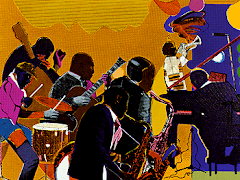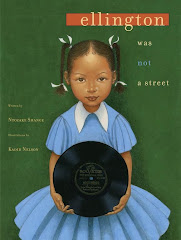

Reviewed By Sojourner Ahebee
June 9,2009
Last summer I took a great writing course with Valerie Harris, who founded and runs the Teen Writing Academy. What was most enlightening about the course I took was that it was held in Paul Robeson’s house, in West Philadelphia. The house was actually owned by his sister, but this was the house where Paul Robeson spent his last years-1966-1976 and the house is now officially a historical landmark. I was in his house everyday for two weeks around his things and his history.
Learning about Mr. Robeson was my first introduction to the ideas of Communism and how it was an idea and system that made many Americans, especially those in power very nervous. I learned that many African-Americans, in the early and middle parts of the 1900s,were attracted to the ideals of Communism because of the racism and poverty that marked their lives. Paul Robeson was one who had once placed much hope in Communism and he paid a great price for putting his hope there.
It is with this little background knowledge that made me excited about seeing the play Things of Dry Hours by Naomi Wallace. This play, directed by Ruben Santiago-Hudson(writer of Lakawanna Blues) and starring Delroy Lindo, Roslyn Ruff and Garret Dillahunt, is now playing at the New York Theatre Workshop until June 28, 2009. I like the play because I learned about a period in American history when the Communist Party had more of an appeal and the support of rural, Southern, African-American workers more than the N.A.A.C.P. did.
The setting of Things of Dry Hours is the 1930s, in Birmingham, Alabama. There are three characters in the play. Delro Lindo plays Tice Hogan, who lives with his adult daughter, Cali, in a shack. Tice, who is a widower, is also a Sunday school teacher and a Communist activist. His two guiding books are the Bible and the Communist Manifesto. Roslyn Ruff plays Cali, who is a widow and washes clothes to support herself and Tice. Tice is constantly preaching the doctrines of the Communist Manifesto to Cali, who doesn’t seem to be too swayed by her father’s ideas. Then comes along Corbin Teel, played by Garret Dillahunt. He is a young, white man supposedly on the run from the police and he needs a place to hide. When he comes to the home of Tice and Cali, he threatens to tell the authorities of Tice’s Communist activities if Tice doesn’t allow Corbin to stay with them.
The essence of the play is what happens between one Black man searching for his dignity through seemingly opposite philosophies-the Bible and Communism-,a white, illiterate man who comes to the Hogan home( but for what reason?) and is taught by Tice the tenets of Communism and Cali, the young, Black woman, who thought she had forgotten how to love.
I especially loved the language of this play, which is very lyrical. I recommend this play for my readers 13 and above. The New York theatre scene is so EXCITING. Tell your parents they don’t have to worry about driving to New York. You guys can take the bus or train together. There are so many travel deals. And you can get discounted theatre tickets from Theatre Mania www.theatermania.com
Go see Things of Dry Hours at the New York Theatre Workshop
79 East 4th Street, New York, New York. For more information contact 212-460-5475 or www.nytw.org
The title of this play is taken from a Gwendolyn Brooks poem. Here it is.
kitchenette building
By Gwendolyn Brooks
Go see Things of Dry Hours at the New York Theatre Workshop
79 East 4th Street, New York, New York. For more information contact 212-460-5475 or www.nytw.org
The title of this play is taken from a Gwendolyn Brooks poem. Here it is.
kitchenette building
By Gwendolyn Brooks
We are things of dry hours and the involuntary plan,
Grayed in, and gray. “Dream” makes a giddy sound, not strong
Like “rent,” “feeding a wife,” “satisfying a man.”
But could a dream send up through onion fumes
Its white and violet, fight with fried potatoes
And yesterday’s garbage ripening in the hall,
Flutter, or sing an aria down these rooms
Even if we were willing to let it in,
Had time to warm it, keep it very clean,
Anticipate a message, let it begin?
We wonder. But not well! not for a minute!
Since Number Five is out of the bathroom now,
We think of lukewarm water, hope to get in it.
Grayed in, and gray. “Dream” makes a giddy sound, not strong
Like “rent,” “feeding a wife,” “satisfying a man.”
But could a dream send up through onion fumes
Its white and violet, fight with fried potatoes
And yesterday’s garbage ripening in the hall,
Flutter, or sing an aria down these rooms
Even if we were willing to let it in,
Had time to warm it, keep it very clean,
Anticipate a message, let it begin?
We wonder. But not well! not for a minute!
Since Number Five is out of the bathroom now,
We think of lukewarm water, hope to get in it.

























No comments:
Post a Comment